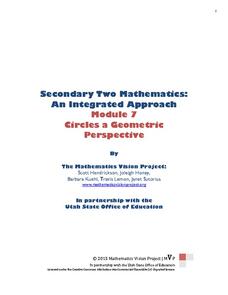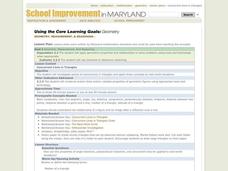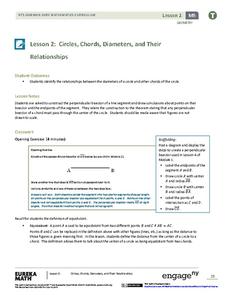CK-12 Foundation
Bisectors of Line Segments and Angles: Cut a Line
Geometric constructions build relationships —by simply manipulating simple tools. An interactive lesson presents a completed construction of a segment bisector and has learners analyze the important aspects. Ultimately, they should be...
CK-12 Foundation
Bisectors of Line Segments and Angles: Cut an Angle
Explore constructions through an interactive online lesson. Given an example of an angle bisector construction, learners investigate the markings to determine the method used. Challenge questions help solidify the steps.
Curated OER
IGD: Perpendicular Bisector
Students draw perpendicular bisectors. In this perpendicular bisectors lesson, students identify the perpendicular bisector in a polygon. They use web tools to create and measure perpendicular bisectors. Students...
Curated OER
Perpendicular Bisector of a Line Segment
High Schoolers investigate the perpendicular bisector of a line segment. They use Cabri Jr. to construct the perpendicular bisector of a segment. The dynamics capabilities of Cabri Jr. allow your learners to observe the lengths of the...
Curated OER
Perpendicular Bisector Theorem
High schoolers construct perpendicular bisectors using Cabri Jr. on their graphing calculator. They then construct conditional statements about perpendicular bisectors along with their converse, inverse, and contrapositive.
Curated OER
Circles and Angles
Students identify tangents, chords and secants. In this geometry lesson, students graph circles and identify angles created by secant lines, tangent lines and chords.
Curated OER
Dividing Line Segments into n Congruent Parts
Pupils identify lines, and line segments. In this geometry lesson, students divide line segments into equal congruent parts. They complete a laboratory activity dealing with lines and segments.
Mathematics Vision Project
Circles: A Geometric Perspective
Circles are the foundation of many geometric concepts and extensions - a point that is thoroughly driven home in this extensive unit. Fundamental properties of circles are investigated (including sector area, angle measure, and...
EngageNY
Characterize Points on a Perpendicular Bisector
Learn transformations through constructions! Pupils use perpendicular bisectors to understand the movement of a reflection and rotation. They discover that the perpendicular bisector(s) determine the line of reflection and the...
Curated OER
Constructing Perpendicular Bisectors
Tenth graders investigate parallel lines and the angles formed when cut by a transversal. In this geometry instructional activity, 10th graders construct perpendicular lines and discuss midpoint, segments and perpendicular bisectors....
Curated OER
Contructions and Conjectures
Students make constructions and conjectures. In this geometry lesson, students construct right, acute and obtuse angles using a straight edge and a protractor. They investigate parallel lines and the angles formed by the angles.
Curated OER
Isosceles Triangles
Students identify the properties of an isosceles triangle. In this geometry instructional activity, students find the midpoint, median and angle bisector of a triangle. They construct angle bisectors and measure missing angles.
Curated OER
Concurrent Lines in Triangles
Students explore the concept of concurrent lines in triangles. For this concurrent lines in triangles lesson, students work in groups to investigate properties of concurrent lines in acute, right, and obtuse triangles. Students use a...
Curated OER
Constructing Perpendiculars
Students construct perpendicular lines. In this geometry lesson, students use a compass and straight edge to do construction. They start from a point to a line.
EngageNY
Circles, Chords, Diameters, and Their Relationships
A diameter is the longest chord possible, but that's not the only relationship between chords and diameters! Young geometry pupils construct perpendicular bisectors of chords to develop a conjecture about the relationships between chords...
EngageNY
Definition of Reflection and Basic Properties
Discover the results of reflecting an image. Learners use transparency paper to manipulate an image using a reflection in this fourth lesson of 18. They finish by reflecting various images across both vertical and horizontal lines.















